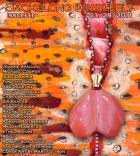Where did the story start for you? With the bat or the sisters?
The story definitely started with the sisters. For a long time, I wrote mostly about the hazards of sisterhood. I had a hard time understanding my own relationship with my own. We picked each other up, we knocked each other down. The relationship between sisters is one of the most intimate, vulnerable unions. “God, Two Girls” was a way for me to deconstruct a sisterhood, to crystallize one moment and see how it spoke to the larger whole.
The part that really holds the piece together for me is the line “Once when she was six and I was nine we waded out into the Atlantic holding hands. It’s gonna be okay, I said and then the waves came crashing down and swallowed her.” I like the parallels of water and this sort of unfocused but unwavering faith in each other throughout the piece, but where did the bat come from?
I like your interpretation that the story is about faith. When I wrote it, I believed the story was much more about drowning, that there was always this struggle between standing and falling, holding someone up while other powers were pulling down. Sometimes those forces are in nature or internal, out of our control, and other times, you are that wave, unrelenting and destructive.
But back to drowning, that’s where the idea of the bat came from. There was one summer in Michigan that bats seemed to be everywhere. They were sneaking between window screens, under eaves, through attics, and down the chimneys of my friends’ homes. Animal Services put out a warning because local bats were testing positive for rabies. If you suspected that you or your pet may have been exposed, you were supposed to capture the bat and bring it to the Health Department for testing. I had a boyfriend who returned home one night to find his cat sitting next to an injured bat on the floor. And what did he do after he caught it? He drowned it. He didn’t want to crush its skull and have the bat’s blood all over his house. So he gave it a long, slow death. He picked the bat up with an oven mitt and held it under water in the same pot he used to boil rice. The image of that bat struggling for air in the aluminum pot haunted me then and still does. It’s a different story, but it sparked this obsession with bats. I found his action profoundly selfish, but I also felt implicated. I wondered, if it were my house, what would I have done? Would I have crushed it with a cinder block or a… Well, you get the idea.
On a side note, the world’s largest urban bat colony lives under the Congress Avenue Bridge in Austin, Texas. Every summer night, hundreds of people gather at dusk and watch 1.5 million bats fly out into the purple sky, circling like clouds of smoke before they disperse into the darkness. After living here for three years, bats have become a more nuanced symbol for me.
You said that this piece started out slightly different. How did it evolve to its final form?
The story started out as an oulipo; the constraint I used was that the last word of each sentence had to be the first word of the next sentence. I didn’t know how it would turn out, but it gave the story a fluid, rushed feel, a state of panic. You can still see the remnants of that constraint. The words nails, patient, sound, and god are still in the original form. Ultimately though, I needed to pull back the repetition so the language didn’t feel contrived.
What do you think is the most important element of flash fiction?
Immediacy. Crystallization. Shiny, sparkling devastation.



 The core workshop of SmokeLong Fitness is all in writing, so you can take part from anywhere at anytime. We are excited about creating a supportive, consistent and structured environment for flash writers to work on their craft in a community. We are thrilled and proud to say that our workshop participants have won, placed, or been listed in every major flash competition. Community works.
The core workshop of SmokeLong Fitness is all in writing, so you can take part from anywhere at anytime. We are excited about creating a supportive, consistent and structured environment for flash writers to work on their craft in a community. We are thrilled and proud to say that our workshop participants have won, placed, or been listed in every major flash competition. Community works.